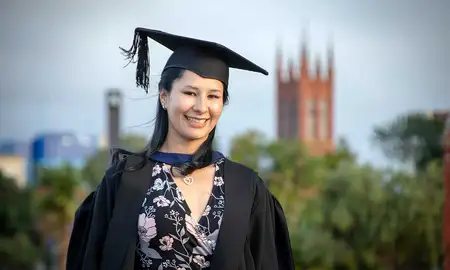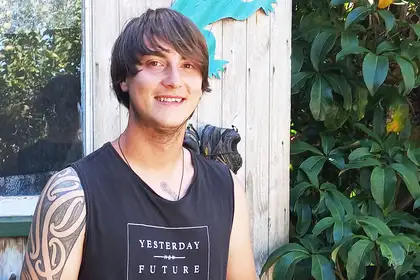
Angus initially enrolled with Te Kunenga ki Pūrehuroa Massey University to major in chemistry and minor in psychology, but after one semester, he says he realised a different path called to him.
“I took an intro paper to Spanish on a whim and realised I had a love for learning languages, so I switched my major to psychology and my minor to Spanish.”
There was also a familial link that drew Angus to the university.
“My grandfather used to be a lecturer at Massey. He also studied there and stayed at Fergusson Hall which is where I stayed in my first year coincidentally, as I didn’t know this when I applied for accommodation on the Manawatū campus.”
The consistency of the beginner classes and the support of the lecturers in the Spanish Programme helped Angus progress into advanced classes. He says he appreciates the challenge the courses provided.
“Cynthia Landa, who taught me through the initial levels of the programme, was really inspiring and pushed me to learn. It made me want to do my best and I would leave her class with a sense of accomplishment. I particularly enjoyed the intermediate courses because they incorporated music into the curriculum. I make my own music and love music in general, so I really enjoyed this aspect. Moving into the advanced course, I did struggle but I think I was supposed to. Now that I live in Spain, I can see why they push you more for the last course because dios mio, it’s hard to speak a foreign language!”
In 2019, Angus was encouraged by Ms Landa to apply for the Prime Minister’s Scholarship for Latin America, which provides the opportunity for students to learn abroad.
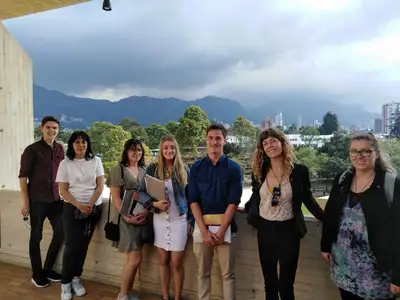
Angus (middle, blue shirt) with the group he went to Colombia with on the Prime Minister's scholarship and the Universidad Nacional de Colombia coordinator.
Angus says the trip was the highlight of his life.
“The experience of travelling to Colombia with five other students and Dr Jose Diaz Rodriguez was incredibly fun and gave me the chance to try speaking Spanish every day. Experiencing the culture of Colombia and the way they speak Spanish was fascinating and uplifting, and to see people break out dancing in the street when they heard good news always put me in a good mood.”
“At the time, there were big protests across South America against government corruption and the mishandling of funds. I think it was a significant, eye-opening experience, particularly seeing El Paro in Bogotá and witnessing people peacefully protesting by walking a parade up the highway, which escalated when the police arrived. Despite a few wild days during our month-long trip, the most memorable thing for me was the passion of the people. For each other and their lives.”
Angus now resides in the Valencian region of Spain where he works as an assistant English teacher in a primary school in Ribesalbes. The opportunity occurred through the connections he made during his time in the Spanish Programme, which he says he’s grateful for.
“Since my visit to Colombia, it’s been my dream to move to a Spanish speaking country. I live in a rural town called Onda and it’s a big change from anywhere else I’ve lived, from the architecture to the public transport. But teaching English has been so fun and the kids are fantastic. Being here means I can put my Spanish to the test and really accelerate my learning in an immersive environment. My working situation also allows me to travel and experience more of Spain.”
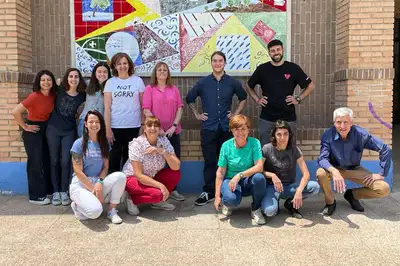
Angus (middle, blue shirt) with the teachers he worked with at CEIP Ribesalbes during his assistant English teaching programme.
Learning Spanish has been a long journey for Angus but one that he says he sees himself continuing into the foreseeable future.
“The most enjoyable part is speaking it – even poorly, it’s a fun sounding language and native speakers enjoy people trying to speak their language. Understanding others in their native tongue is a treasure. The challenge is the rollercoaster of getting good, thinking you’ve got it, then having an interaction that proves you have more to learn. The sheer amount of vocabulary you need to learn would be daunting to see on one page, not to mention conjugations of verbs. This is why I believe a formal education is important to learn Spanish. I still need to refresh my mind every day.”
Angus says learning Spanish has also helped him connect with his own culture.
“I did the introduction to te reo Māori course Te Reo Whakahoahoa, which gave me a stronger appreciation and understanding of te reo, while studying intermediate Spanish. Spanish helped with the vowel sounds as they are the same. I found I progressed a lot faster than others because having learnt another language that has a different formula for sense-making compared to English helped my mind relax into the unknown grammar of te reo.”
To anyone considering learning Spanish, Angus says to just do it. He credits the Spanish Programme for teaching him the language and the culture, as well as igniting a fire in his belly to continue learning and to have an appreciation for others and their culture.
“What I really enjoy about learning languages is each language has its own secrets. You don’t just learn a language, you learn about life from a different perspective. You learn a culture, a world view. You can use words that don’t have exact translations to English but have a feeling contained within them. Me gusta hablar español porque me hace sentir como un mago, y tengo que recordar que yo no sé muchas cosas y eso me empuja a aprender más y nunca pensar que lo sé todo en este mundo.”
Interested in learning Spanish?
Related news
Expressive arts students visit Colombia
Eight expressive arts students recently had the opportunity to visit Bogotá, Colombia, thanks to the Prime Minister's Scholarships to Latin America.
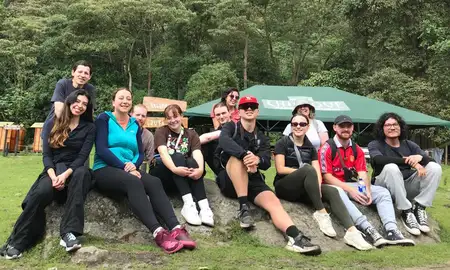
25 years of Spanish language at Massey
April 23 is International Spanish Language Day, an event marked around the world to celebrate the richness of the language and the cultures. And Massey's Spanish language programme celebrates its 25-year anniversary in 2021.
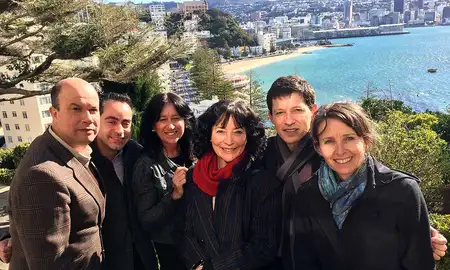
Keeping Spanish language alive on the home front
Colombian-born teacher Andrea Ceron shifts easily between speaking her native Spanish and English, her second language.
